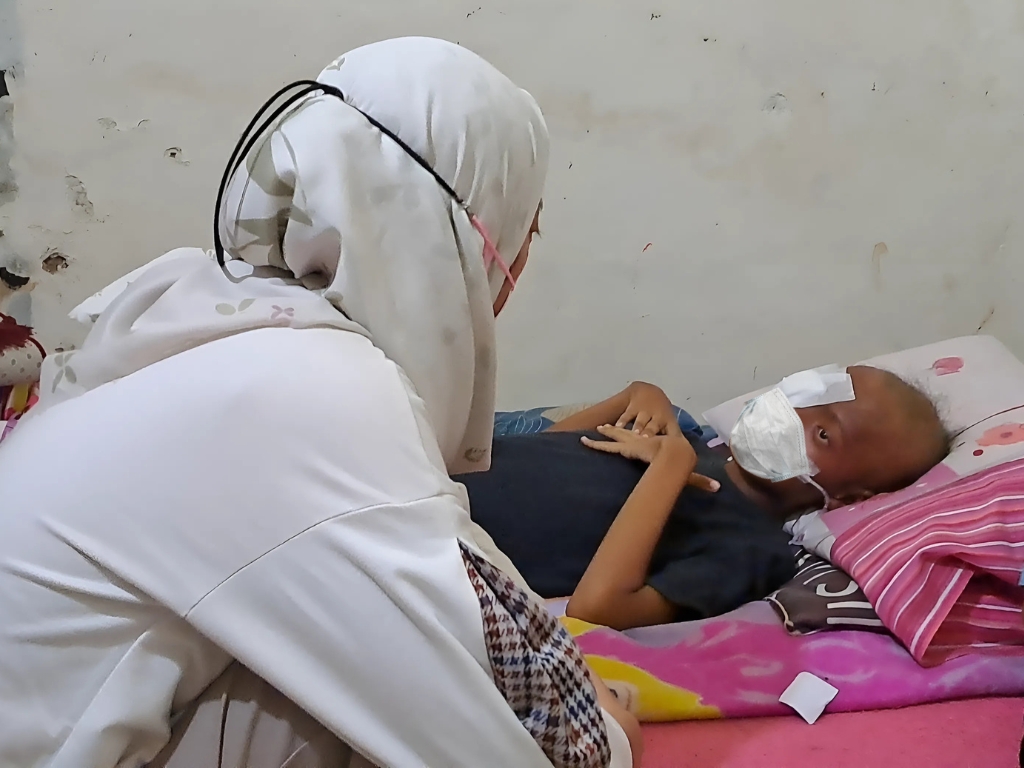(by Moza Adilen – Communications and Fundraising Officer)

Farhan* was just like any other 16-year-old, bursting with dreams and enjoying the simple joys of teenage life. But in April, his life was turned upside down by an unexpected diagnosis – rhabdomyosarcoma, a rare and aggressive cancer of the muscle tissue. What began as a small pimple-like bump on his face quickly grew, invading his facial nerves and robbing him of much of his sight. This cruel disease took away not only his vision, it stole the carefree days of adolescence he once knew.
Farhan’s greatest passion was hadrah, a traditional form of Islamic music involving the rhythmic beating of handheld drums while reciting poetry and prayers. It was more than a pastime for him – it was a spiritual and communal bond that brought him immense joy. Hadrah allowed him to express his soul through rhythm, and he found joy in the harmonious unity of the group. But as the tumor grew, affecting his face and vision, Farhan found it increasingly difficult to participate. It felt like a deeply personal loss as if the cancer was taking not just his health but also the things that made him feel alive.
Despite the unimaginable challenges, Farhan’s spirit remained strong. He refused to let the illness define him, meeting each day with quiet courage. Farhan’s resilience was met with the unwavering support from his parents, pouring all their love and energy into making his days as comfortable and joyful as possible.
When his oncologist referred Farhan to Rachel House’s home-based palliative care service, it marked a turning point in his journey. The care team, led by Nurse Eka, stepped in not only to manage his pain and monitor his medical condition but to provide the holistic support that Farhan and his family needed. The mass on Farhan’s face was pressing against his airway, threatening shortness of breath, while radiation and chemotherapy brought side effects that required close monitoring. But alongside this medical care, it was the emotional and psychological support that truly made the difference.
For the past two months, Nurse Eka had been a constant presence in Farhan’s life. She was not just a nurse – she became part of the family’s support system. Her focus was on making Farhan’s remaining days as comfortable as possible, teaching his parents how to manage his pain, and offering practical tips to make his daily routine easier. This home-based palliative care ensured that Farhan could remain in the comfort of his own home, surrounded by the people he loved, rather than in a hospital.
Nurse Eka often emphasized that palliative care is more than just symptom management—it’s about empowering families to care for their loved ones with confidence. With her guidance, Farhan’s parents learned to care for him in a way that preserved his dignity and comfort. The emotional burden of caregiving was lightened by the knowledge that they were doing everything possible to make his days better.
The impact of home-based palliative care cannot be overstated. Farhan’s family didn’t have to face this journey alone. They were supported, educated, and given the tools to care for their son in the familiarity of their home, where Farhan could still find moments of peace, love, and connection.
Through it all, Farhan continued to smile. Though his body weakened, his spirit remained unbroken. The love of his family and the compassionate care provided by Nurse Eka allowed him to live his remaining days with grace. The cancer may have taken much from him, but it could never take away his courage.
Farhan’s story is a reminder of the profound difference that home-based palliative care can make for children facing life-threatening illnesses. It’s about more than medical care—it’s about giving families the support they need to ensure their loved ones can live with dignity, surrounded by love.
*Name changed for privacy